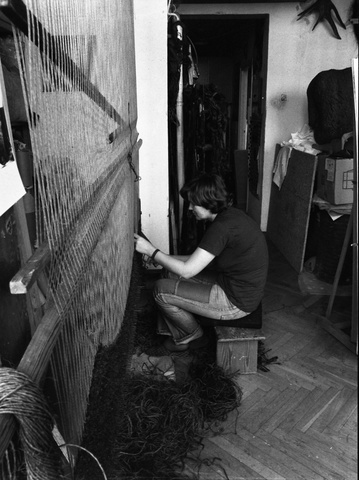call for papers
New horizons in textile art history: critical perspectives on post-war textile art from Central and Eastern Europe and the Baltics
edited by Magdalena Furmaniuk, Sandra Imko and Monica Seiceanu
In the 1960s, textile art underwent a profound transformation. Movements such as La Nouvelle Tapisserie (also known in Poland as nowa tkanina) and Fiber Art emerged in parallel across Europe and North America, reimagining weaving not merely as a decorative craft but as a site of conceptual and material experimentation. While La Nouvelle Tapisserie often carried a distinctly European character, Fiber Art became a more international, Anglophone designation for similar developments. Both challenged traditional hierarchies in the arts, expanding the field’s formal and critical vocabulary. Artists from Central and Eastern Europe played a crucial role in this global shift—figures such as Magdalena Abakanowicz, Jagoda Buić, Ritzi and Peter Jacobi significantly redefined textile art’s position within the visual arts. Often declining their weaving practices towards sculpture and installation, these artists developed new forms shaped by the material constraints and aesthetic possibilities of their regional contexts.
At the time, it was declared that textiles had finally secured a place among the fine arts. Yet institutional and cultural recognition remained uneven. Today, we are witnessing what appears to be a more substantive reevaluation of textile practices, as major museums expand their collecting policies, feminist art histories gain traction globally, and previously marginalised mediums are newly integrated into contemporary and historical narratives. We propose that this convergence of institutional, academic, and curatorial interest marks a pivotal moment, one that not only allows for the recovery of overlooked histories but also urges us to rethink the epistemologies that shape the study and display of textile art.
This issue seeks to foreground post-war voices and practices from Central and Eastern Europe and the Baltic region, in order to surface untold narratives and to examine new methodologies. Specific geopolitical, material, and pedagogical conditions made these regions uniquely fertile grounds for innovation in textile practice. Some state-sponsored art schools prioritised textile as a discipline, while material shortages led to creative reuse and experimentation, and ideological tensions shaped how textiles could be both expressive and subversive.
We invite contributions that engage critically, conceptually, and methodologically with textile art. We are particularly interested in papers that not only fill historical gaps but also question the epistemological structures underpinning textile research. What methods do we bring to the study of fiber art, and how might textile itself—its softness, tactility, labour, or materiality—reshape our critical tools?
We especially welcome submissions that:
- Problematise textile as a medium and a material;
- Offer critical reflections on the historiography of textile art;
- Engage with under-researched or forgotten artists, movements, or moments in the CEE and Baltic regions;
- Propose new methodological approaches grounded in the material, conceptual, economic or political dimensions of textiles;
- Revisit and critique recent scholarly publications or curatorial efforts on fiber art;
- Explore how textile art unsettles disciplinary boundaries or opens new avenues for cultural analysis.
We welcome contributions from scholars, artists, and practitioners at all stages of their careers, and are particularly interested in cross-disciplinary approaches. We invite you to submit proposals for academic papers (double-blind peer reviewed), exhibition and book reviews, visual materials, and interviews. Please see the detailed profile of the journal as outlined in the „Aims and Scope” section.
The submission must adhere to the ethical and editorial standards of the journal and include the following:
- The title and abstract of up to 1,800 characters
- A list of 5–6 keywords
- The author’s name and surname, email address, degree information, academic affiliation
- The author’s academic biography up to 1,000 characters, including the ORCID number
Timeline:
- Abstract submission deadline: October 15, 2025
- Notification of acceptance: November 5, 2025
- Full paper submission: March 20, 2026
Languages: English, Polish
Proposals should be submitted to the following email addresses: textilehorizons2026@gmail.com, miejsce@cybis.asp.waw.pl
The issue will be published on this website in the first quarter of 2027.
For the evaluating process of the submissions see here. For the reviewing procedures see here. If you require additional information or clarification, please do not hesitate to contact us.
